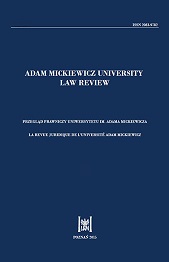Non-Originalism Differently: the Obligation of the Legislator to Respond to Changing Conditions
Non-Originalism Differently: the Obligation of the Legislator to Respond to Changing Conditions
Author(s): Jana KokešováSubject(s): Constitutional Law, Philosophy of Law, Sociology of Law
Published by: Uniwersytet Adama Mickiewicza
Keywords: Legislator; Constitutional Court; Czech Republic; Changes; Society; Law; Statutes; Omission; Unconstitutional inactivity; Communication; Context; Content; Sources of Law; Law-making;
Summary/Abstract: The question that the paper seeks to answer is formulated through reflections on the issues of non-originalism. Non-originalism refers to an approach to the interpretation of the Constitution where the text of the Constitution adapts to new conditions without any formal change. This approach is applied by courts which, in the light of new circumstances, interpret the Constitution in a different way. The question is whether the same approach should also be applied by the legislator. Should it be the legislator who monitors whether the Constitution has changed in substance as a result of changes in society and that some existing statutes thus have become unconstitutional? The paper concludes that the legislator has an obligation to monitor and respond to such changes by amending or abolishing certain statutes or by adopting new ones. If the legislator fails to respond, then his behaviour – inaction – is unconstitutional. However, the paper does not claim that the legislator must respond to all the changes in society, but only to those that are significant and obvious. The legislator is understood as an institution, not as a member of the legislative body (based on the theory of the legislative intent). However, the institution of the legislator is a human creation and composed of individuals, and it is their knowledge that makes up the knowledge of the legislator. And it is precisely their possibilities that determine the boundaries of what the legislator should know. In this text, the creation of law is understood as communication between the legislator, who is the author of statutes, and public bodies, who interpret and apply them. As with any communication, context is what determines it. The legislator’s obligations are derived from the content of the context, its function, and its essential position in communication.
Journal: Przegląd Prawniczy Uniwersytetu im. Adama Mickiewicza
- Issue Year: 2018
- Issue No: 8
- Page Range: 217-236
- Page Count: 20
- Language: English

